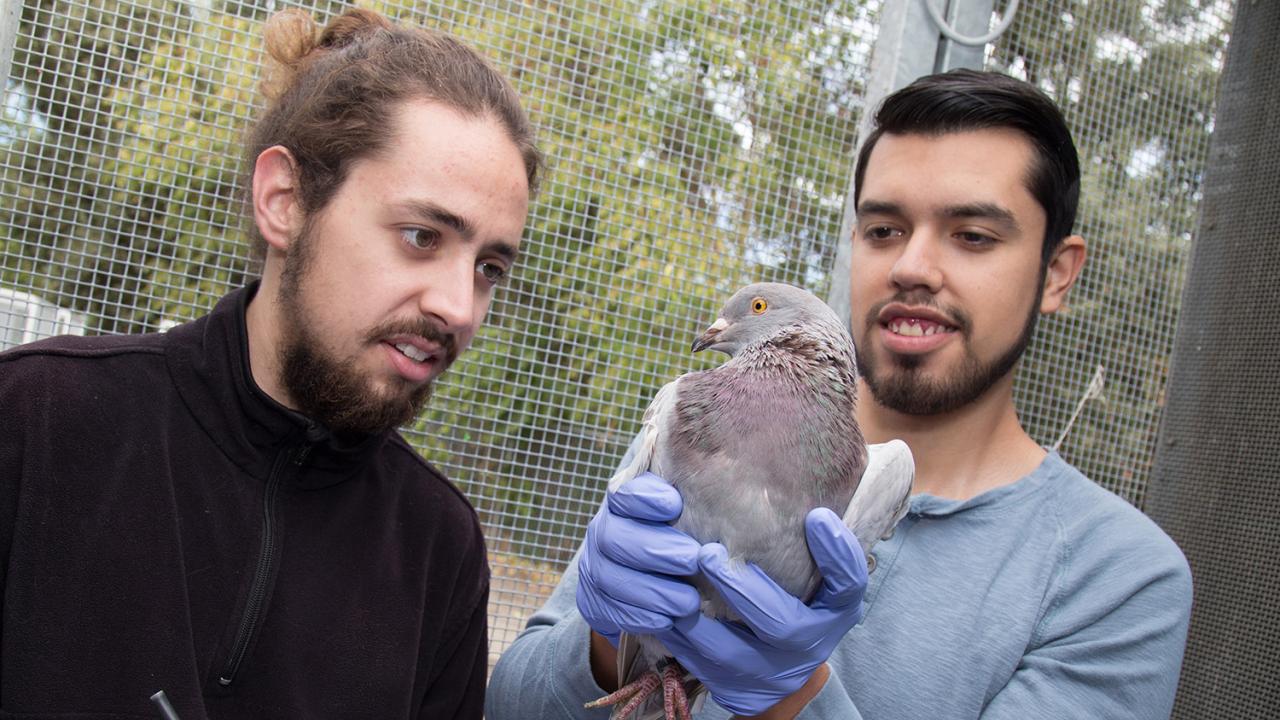
Creating Research Opportunities in the Calisi Lab, One Undergraduate at a Time
A hallmark of the UC Davis undergraduate experience is working alongside graduate students and faculty to conduct scientific research. But too often, undergraduates must make a difficult choice between accepting an unpaid internship or finding a part-time job unrelated to their academic interests.
To encourage students to gain hands-on experience, Assistant Professor Rebecca M. Calisi Rodríguez, Department of Neurobiology, Physiology and Behavior in the College of Biological Sciences, launched the Calisi Lab Undergraduate Research Program. Relying heavily on philanthropic support, the program employs students as researchers in animal science, neuroendocrinology and reproductive behavior. Calisi Rodríguez’s goal is to make sure students don’t sacrifice research opportunities to make ends meet.
Research, it’s for the birds
About one mile west of central campus, pigeons coo outside the Aquatic Biology and Environmental Sciences Building. Some alight on wood perches, while others nest in pigeonholes, huddled over eggs.
“After being in the lab all day over the summer, it’s pretty refreshing to be back out here with the birds,” says senior Tanner Feustel, an animal science major.
Feustel holds a clipboard in his gloved hands. He moves about the cages, inspecting nests and logging data. Are there any new eggs? Who’s pairing with whom? Feustel jots it all down while pigeons strut and flutter around him.

Here, among the feathers, the Calisi Lab’s undergraduate researchers learn firsthand what it takes to conduct animal research. With approximately 150 breeding pairs at the aviary, the students feed the birds and perform health checks, ensuring the colony is happy and healthy. This proximity is of utmost importance for fledgling scientists.
“In the laboratory, we’re often so removed from the organism that we’re studying, it can be a barrier to understanding how things function,” says Calisi Rodríguez. “It’s powerful to know your organism and its behavior.”
But research in the Calisi Lab isn’t limited to feathered subjects. Janin Rodarte, a junior studying environmental policy, spent the last year investigating the effects of pesticides on mosquitofish. The work dovetails with Calisi Rodríguez’s work on the effects of environmental toxins in urban pigeon populations.
“Working with the Calisi Lab is really cool because you have so many opportunities,” says Rodarte. “For an undergrad student, it opens paths to whatever direction you want to take.”
The making of an aviary manager
Brandon Nava Ultreras had never worked with pigeons before. He was more used to household pets. But through a mentorship program with the UC Davis AB540 and Undocumented Student Center, Ultreras, a senior biological sciences and Chicana/Chicano studies double major, met Calisi Rodríguez. She soon convinced him to join her team.
“I’ve had students contact me with no experience or references, but when I bring them in for an interview, they’re passionate and my gut says go with them,” Calisi Rodríguez says. “My gut hasn’t been wrong yet.”
Today, Ultreras is the Calisi Lab’s aviary manager, and he’s using the resources available to him for his own research. Ultreras studies the expression of prolactin, the hormone responsible for milk production, in pigeons.
“What’s really interesting about pigeons is both the males and females lactate to feed their young,” he says. “A lot of the genes and hormones that we study in the birds are related to our hormones.”
By studying the pigeons at the Calisi Lab, Ultreras found that prolactin expression in adult pigeons increased as their eggs moved closer to the hatching stage.
“Our results suggest that presence of chicks is an important regulatory mechanism in the hormonal signaling of lactation,” Ultreras says. His findings give us a clearer picture of how birds are able to lactate when their chicks hatch.
Ultreras presented his preliminary research at last year’s UC Davis Undergraduate Research Conference and plans to present research at future conferences.
“Not a lot of people have the privilege or the independence as an undergrad to do their own research,” he says. “I’m really thankful for this opportunity. It’s been really wonderful.”
Shifting the mindset of undergraduate research culture
When Calisi Rodríguez was a student, unpaid undergraduate research was the norm.

“The mentality was that undergraduates should just be thankful for having a research experience,” she says.
In Calisi Rodríguez's mind, this mentality marginalizes the financially disadvantaged, keeping academia’s door open only to those who can afford living without a paycheck.
“By not paying our undergrads or not compensating them in some way, we are perpetuating inequities in the field at the level of undergrad research,” she says. “To solve the problem, we pay them when we can, but these are tough funding times.”
For the student researchers Calisi Rodríguez is unable to pay, she supports work-study financial assistance and academic course credit in exchange for work. In addition to research experience, the undergraduates benefit from Calisi Rodríguez and her team’s mentorship and guidance. She tries to foster a familial environment, where students can share their thoughts and emotions.
“I think that mentoring con cariño, with love, can be very powerful,” she says. “It works not because I’m doing anything magical, but because trust and empathy build a strong team.”
The Calisi Lab Undergraduate Research Program relies heavily on philanthropic support. You can make a gift to the program online to help provide new research opportunities for students.
